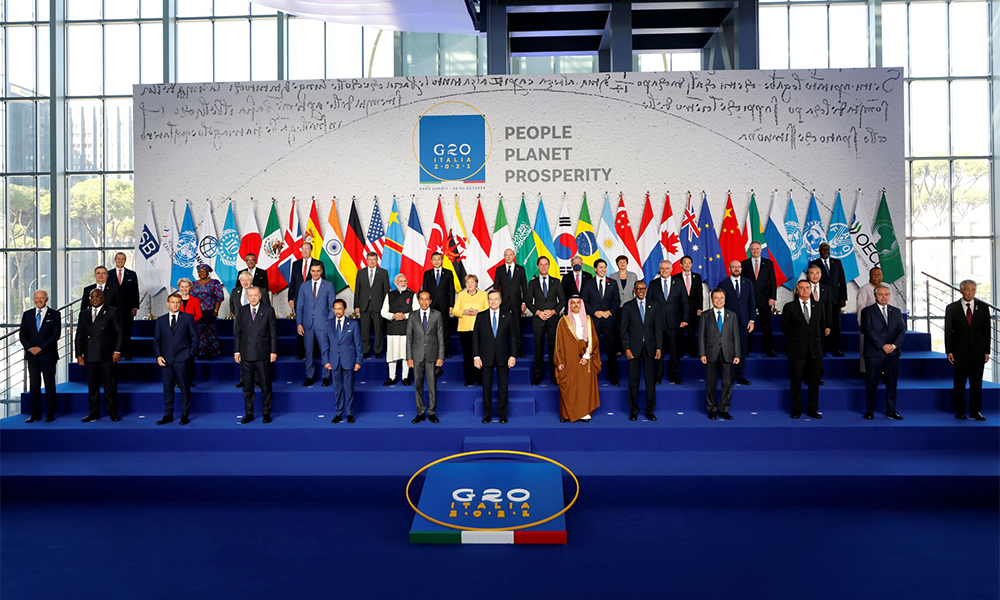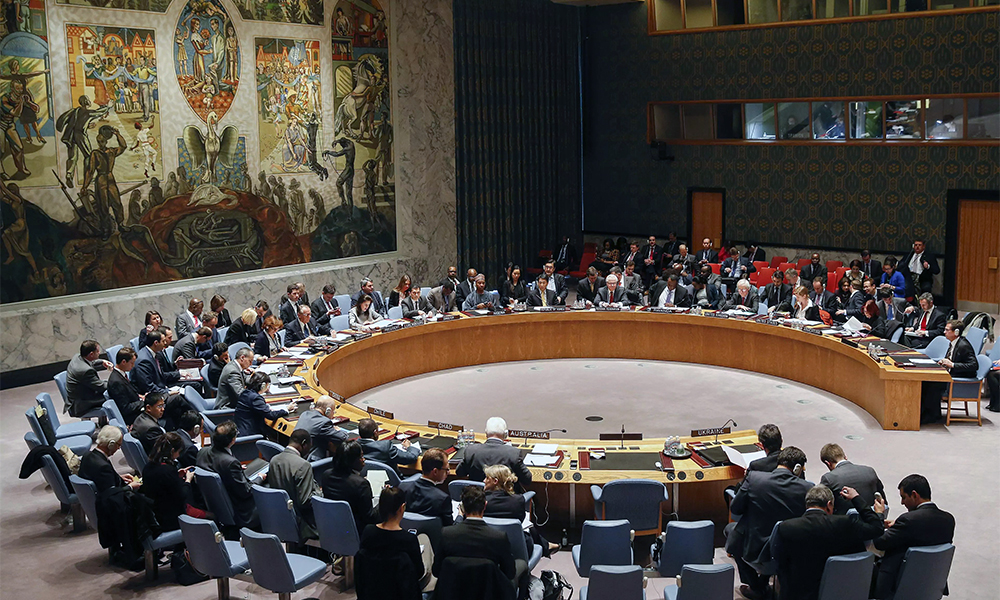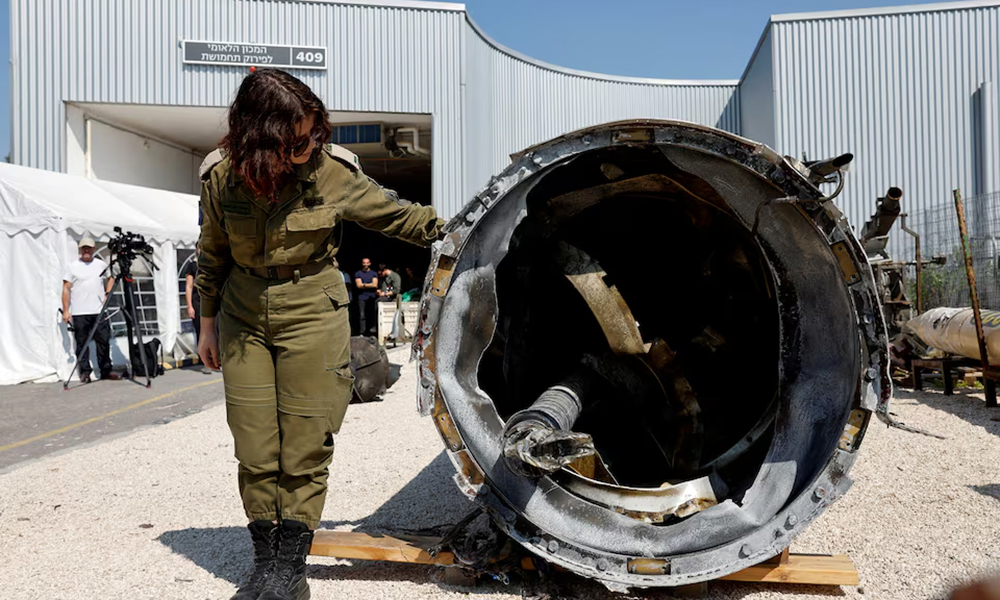World
G20 leaders endorse tax deal, pledge more vaccines for the poor

Leaders of the world’s 20 biggest economies endorsed on Saturday a global minimum tax aimed at stopping big business from hiding profits in tax havens, and also agreed to get more COVID vaccines to poorer nations, Reuters reported.
Attending their first in-person summit in two years, G20 leaders broadly backed calls to extend debt relief for impoverished countries and pledged to vaccinate 70% of the world’s population against COVID-19 by mid-2022.
However, with a crucial U.N. climate conference due to start in just two days, the G20 appeared to be struggling to throw its weight behind the sort of strong new measures that scientists say are needed to avert calamitous global warming.
According to Reuters Italy, hosting the gathering in Rome, put health and the economy at the top of the agenda for the first day of the meeting, with the more difficult climate discussions set for Sunday.
Underscoring the way the coronavirus crisis has up-ended the world, doctors in white coats and Red Cross workers joined the leaders for their traditional “family” photograph — a tribute to the sacrifices and efforts of medics across the globe.
Addressing the opening of the meeting, being held in a steel and glass convention centre, Italian Prime Minister Mario Draghi said governments had to work together to face up to the formidable challenges facing their peoples.
“From the pandemic, to climate change, to fair and equitable taxation, going it alone is simply not an option,” Draghi said.
The corporate tax deal was hailed as a evidence of renewed multilateral coordination, with major corporations facing a minimum 15% tax wherever they operate from 2023 to prevent them from shielding their profits in off-shore entities, read the report.
“This is more than just a tax deal – it’s diplomacy reshaping our global economy and delivering for our people,” U.S. President Joe Biden wrote on Twitter.
With the world roiled by rising energy prices and stretched supply chains, Biden was expected to urge G20 energy producers with spare capacity to boost production, notably Russia and Saudi Arabia, to ensure a stronger global economic recovery, a senior U.S. administration official said.
DIMMED HOPES
According to the report like many of the other G20 leaders in Italy, Biden will fly straight to Glasgow on Sunday for the United Nations’ climate summit, known as COP26, which is seen as crucial to addressing the threat of rising temperatures.
The G20 bloc, which includes Brazil, China, India, Germany and the United States, accounts for an estimated 80% of global greenhouse gas emissions, but hopes the Rome meeting might pave the way to success in Scotland have dimmed considerably.
Chinese President Xi Jinping and Russia’s Vladimir Putin both decided to follow events only via video link and diplomats looking to seal a meaningful accord said both countries, as well as India, were resisting ambitious new climate goals.
British Prime Minister Boris Johnson acknowledged the G20 and COP26 talks would be difficult, but warned that without courageous action, world civilisation could collapse as swiftly as the ancient Roman empire, ushering in a new Dark Age, Reuters reported.
“It’s going to be very, very tough to get the agreement we need,” he told reporters, standing next to the ruins of the Colosseum amphitheatre – a symbol of once mighty Rome.
CLIMATE EFFORTS
A draft communique seen by Reuters said G20 countries will step up their efforts to limit global warming at 1.5 degrees Celsius – the level scientists have said is necessary to avoid disastrous new climate patterns. read more
The document also acknowledges that current national plans on how to curb harmful emissions will have to be strengthened, but offered little detail on how this should be done.
Additionally, the leaders are set to pledge to halt financing of overseas coal-fired power generation by the end of this year, and to “do our utmost” to stop building new coal power plants before the end of the 2030s, Reuters said.
Apparently relishing in-person diplomacy after months of relative isolation, the leaders held numerous meetings on the sidelines, including discussions between the United States, Britain, Germany and France on Iran’s nuclear programme.
“It is great to see all of you here, after a difficult few years for the global community,” Draghi said, catching the largely upbeat mood amongst those present.
Far from the conference centre, known as ‘The Cloud’, several thousand protesters staged a loud, but peaceful demonstration in the city centre to demand action to stem climate change.
“We are holding this protest for environmental and social issues and against the G20, which continues undaunted on a path that has almost led us to social and ecological failure,” said protester Edoardo Mentrasti.
World
UN Security Council to vote Friday on Palestinian UN membership

The United Nations Security Council is scheduled to vote Friday on a Palestinian request for full U.N. membership, said diplomats, a move that Israel ally the United States is expected to block because it would effectively recognize a Palestinian state.
The 15-member council is due to vote at 3 pm Friday on a draft resolution that recommends to the 193-member U.N. General Assembly that “the State of Palestine be admitted to membership of the United Nations,” diplomats told Reuters.
A council resolution needs at least nine votes in favor and no vetoes by the U.S., Britain, France, Russia or China to pass. Diplomats say the measure could have the support of up to 13 council members, which would force the U.S. to use its veto.
Council member Algeria, which put forward the draft resolution, had requested a vote for Thursday afternoon to coincide with a Security Council meeting on the Middle East, which is due to be attended by several ministers.
The United States has said that establishing an independent Palestinian state should happen through direct negotiations between the parties and not at the United Nations.
“We do not see that doing a resolution in the Security Council will necessarily get us to a place where we can find … a two-state solution moving forward,” U.S. Ambassador to the U.N. Linda Thomas-Greenfield said on Wednesday.
The Palestinians are currently a non-member observer state, a de facto recognition of statehood that was granted by the 193-member U.N. General Assembly in 2012. But an application to become a full U.N. member needs to be approved by the Security Council and then at least two-thirds of the General Assembly.
The U.N. Security Council has long endorsed a vision of two states living side by side within secure and recognized borders. Palestinians want a state in the West Bank, east Jerusalem and Gaza Strip, all territory captured by Israel in 1967.
Little progress has been made on achieving Palestinian statehood since the signing of the Oslo Accords between Israel and the Palestinian Authority in the early 1990s.
World
EU leaders back new Iran sanctions after attack on Israel

European Union leaders decided on Wednesday to step up sanctions against Iran after Tehran’s missile and drone attack on Israel left world powers scrambling to prevent a wider conflict in the Middle East, Reuters reported.
The summit in Brussels is the first meeting of the EU’s 27 national leaders since Saturday’s attack, more than six months into the war between Israel and the Iran-backed Palestinian militant group Hamas.
Israel has signalled it will retaliate but has not said how. EU leaders condemned the Iranian attack, reaffirmed their commitment to Israel’s security and called on all sides to prevent more tensions, including in Lebanon.
“We feel it’s very important to do everything to isolate Iran,” said summit chairman Charles Michel, adding the new sanctions against the Islamic Republic would target companies involved in the production of drones and missiles.
German Chancellor Olaf Scholz said it was important that Israel “does not respond with a massive attack of its own.”
Italy spoke separately ahead of G7 talks in favour of sanctions against arms suppliers linked to the attack against Israel, as well as those behind attacks on ships in the Red Sea, read the report.
Iran launched its assault in response to an April 1 strike on its embassy in Damascus which it blamed on Israel. Tel Aviv started its broader military offensive in Gaza after Hamas’ deadly attack on Israel on Oct. 7.
ISRAEL AND UKRAINE
EU foreign ministers are due to continue the sanctions work on Monday as the United States and its Western allies hope new steps against Iran will help limit any Israeli retaliation.
The EU already has multiple programmes that target Iran for human rights abuses, the proliferation of weapons of mass destruction, and Tehran’s support for Russia’s war in Ukraine, Reuters reported.
Germany, France and several EU states are looking at expanding a scheme that seeks to curb the supply of Iranian drones to Russia to include the provision of missiles and cover deliveries to Iranian proxies in the Middle East.
Belgium backed introducing sanctions against Iran’s Revolutionary Guard Corps but Scholz said that required further legal checks. The bloc’s top diplomat has said that could only happen if a national authority in the EU found that the group had been involved in terrorist activity.
Analysts say Iran is unlikely to face more severe economic punishment because of worries about boosting oil prices and angering top buyer China.
With the Middle East capturing much of the EU’s attention, Ukraine’s President Volodymyr Zelenskiy appealed for more help in holding the line against Russia, which unleashed an invasion against its neighbour more than two years ago, read the report.
“Here in Ukraine, in our part of Europe, unfortunately, we do not have the level of defence that we all saw in the Middle East a few days ago,” Zelenskiy told the summit, after Israel and allies mostly shot down the incoming drones and missiles.
“It reflects our current key need – the need for air defence,” he said, according to an EU official, repeating his calls for speedier deliveries of the weapons and ammunition previously promised to Ukraine.
World
US and allies plan more Iran sanctions; Israel war cabinet to meet again

The U.S. and its allies planned fresh sanctions against Iran over its unprecedented attack on Israel, seeking to dissuade Israel from a major escalation as its war cabinet was set to meet for a third time on Wednesday to decide a response, Reuters reported.
While Saturday night’s attack caused no deaths and little damage thanks to the air defences and countermeasures of Israel and its allies, it has increased fears that violence rooted in the six-month-old Gaza war is spreading, with the risk of open war between long-time adversaries Iran and Israel.
Israel’s military chief of staff Herzi Halevi had promised Iran’s launch of more than 300 missiles, cruise missiles and drones at Israeli territory “will be met with a response”, but gave no details.
An Israeli government source said the war cabinet session scheduled for Tuesday had been put off until Wednesday, without elaborating, read the report.
Hoping to steer Israel away from massive retaliation, the U.S. and Europe flagged a toughening of economic and political sanctions against Iran.
The U.S. is planning to impose new sanctions targeting Iran’s missile and drone programme in the coming days and expects its allies will be following suit, National Security Advisor Jake Sullivan said in a statement on Tuesday.
Earlier, Treasury Secretary Janet Yellen said the U.S. would use sanctions, and work with allies, to keep disrupting Iran’s “malign and destabilising activity”.
She told a news conference in Washington all options to disrupt Iran’s “terrorist financing” were on the table, and she expected further sanctions against Iran to be announced soon.
European Union foreign policy chief Josep Borrell, speaking in Brussels after an emergency video conference of EU foreign ministers, said some member states had asked for sanctions against Iran to be expanded and that the bloc’s diplomatic service would begin working on the proposal.
Borrell said the proposal would expand a sanctions regime that seeks to curb the supply of Iranian drones to Russia so that it would also include the provision of missiles and could also cover deliveries to Iranian proxies in the Middle East.
Israeli Foreign Minister Israel Katz said he was “leading a diplomatic attack”, writing to 32 countries to ask them to place sanctions on Iran’s missile programme and follow Washington in proscribing its dominant military force, the Revolutionary Guard Corps, as a terrorist group, Reuters reported.
‘CALM HEADS’
Iran launched the attack in retaliation for an airstrike on its embassy compound in Damascus on April 1 attributed to Israel, but has signalled that it now deems the matter closed.
President Joe Biden told Israeli Prime Minister Benjamin Netanyahu at the weekend that the United States, Israel’s main protector, would not participate in an Israeli counter-strike.
British Prime Minister Rishi Sunak told Netanyahu in a call on Tuesday that escalation in the Middle East was in nobody’s interest and would only worsen insecurity in the region, so it was “a moment for calm heads to prevail”, Sunak’s office said.
Japan Foreign Minister Yoko Kamikawa “strongly urged Israel to exercise restraint” during a call with her Israeli counterpart Israel Kantz on Tuesday evening, according to a readout of the call issued by Japan’s foreign ministry.
The prospect of Israeli retaliation has alarmed many Iranians already enduring economic pain and tighter social and political controls since major protests in 2022-23, read the report.
Since the war in Gaza began in October, clashes have erupted between Israel and Iran-aligned groups based in Lebanon, Syria, Yemen and Iraq.
Israel said four of its soldiers were wounded hundreds of metres inside Lebanese territory overnight, the first known Israeli ground penetration into Lebanon since the Gaza war erupted, although it has regularly traded fire with the heavily armed Lebanese Hezbollah militia.
In Gaza itself, where more than 33,000 Palestinians have been killed in the Israeli offensive according to Gaza health ministry figures, Iran’s action drew applause.
Israel began its campaign against Hamas, the Iranian-backed Palestinian militant group that runs Gaza, after the militants attacked Israel on Oct. 7, killing 1,200 people and taking 253 hostages, by Israeli tallies.
-

 Sport4 days ago
Sport4 days agoACL fever grows as fixtures finalized
-

 World5 days ago
World5 days agoUS will not take part in any Israeli retaliatory action against Iran
-

 Latest News4 days ago
Latest News4 days agoOver 50 people dead in traffic accidents over Eid
-

 Latest News4 days ago
Latest News4 days agoUS identifies Kabul airport suicide bomber
-

 Business4 days ago
Business4 days agoAfghanistan-Kazakhstan chamber of commerce opens in Herat
-

 Latest News5 days ago
Latest News5 days agoGood rains enable DABS to increase power production in Kabul
-

 World4 days ago
World4 days agoIsraeli military vows response to Iran attack as calls for restraint mount
-

 Latest News3 days ago
Latest News3 days agoPakistani police give Afghans in Balochistan one day to leave
























